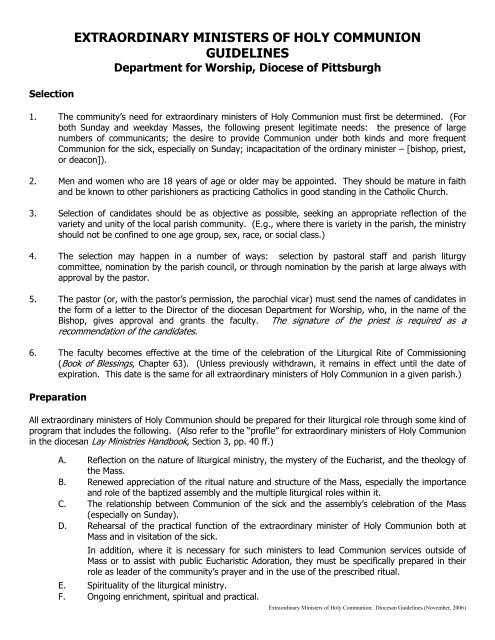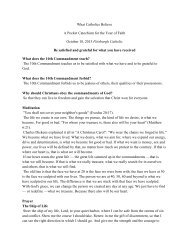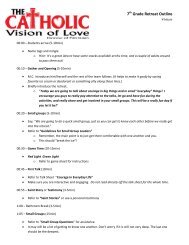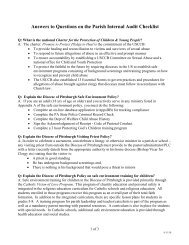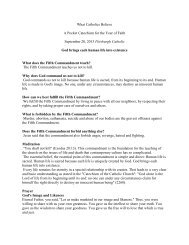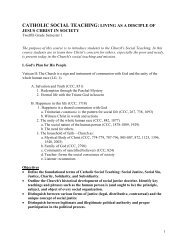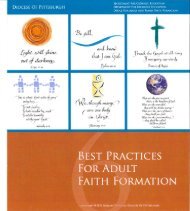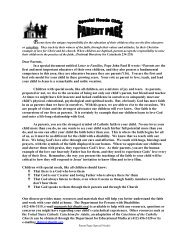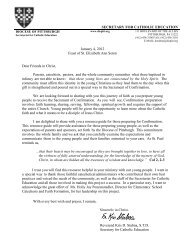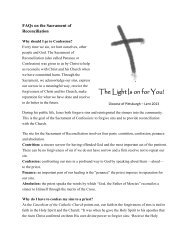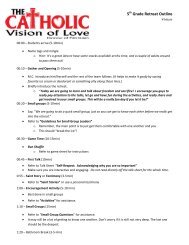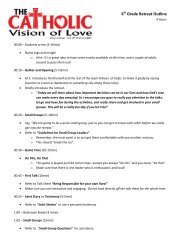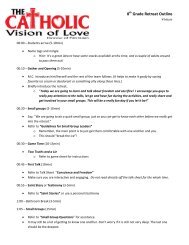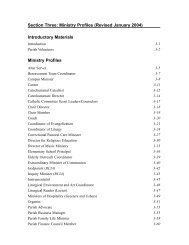EXTRAORDINARY MINISTERS OF COMMUNION
EXTRAORDINARY MINISTERS OF COMMUNION
EXTRAORDINARY MINISTERS OF COMMUNION
You also want an ePaper? Increase the reach of your titles
YUMPU automatically turns print PDFs into web optimized ePapers that Google loves.
Selection<br />
<strong>EXTRAORDINARY</strong> <strong>MINISTERS</strong> <strong>OF</strong> HOLY <strong>COMMUNION</strong><br />
GUIDELINES<br />
Department for Worship, Diocese of Pittsburgh<br />
1. The community’s need for extraordinary ministers of Holy Communion must first be determined. (For<br />
both Sunday and weekday Masses, the following present legitimate needs: the presence of large<br />
numbers of communicants; the desire to provide Communion under both kinds and more frequent<br />
Communion for the sick, especially on Sunday; incapacitation of the ordinary minister – [bishop, priest,<br />
or deacon]).<br />
2. Men and women who are 18 years of age or older may be appointed. They should be mature in faith<br />
and be known to other parishioners as practicing Catholics in good standing in the Catholic Church.<br />
3. Selection of candidates should be as objective as possible, seeking an appropriate reflection of the<br />
variety and unity of the local parish community. (E.g., where there is variety in the parish, the ministry<br />
should not be confined to one age group, sex, race, or social class.)<br />
4. The selection may happen in a number of ways: selection by pastoral staff and parish liturgy<br />
committee, nomination by the parish council, or through nomination by the parish at large always with<br />
approval by the pastor.<br />
5. The pastor (or, with the pastor’s permission, the parochial vicar) must send the names of candidates in<br />
the form of a letter to the Director of the diocesan Department for Worship, who, in the name of the<br />
Bishop, gives approval and grants the faculty. The signature of the priest is required as a<br />
recommendation of the candidates.<br />
6. The faculty becomes effective at the time of the celebration of the Liturgical Rite of Commissioning<br />
(Book of Blessings, Chapter 63). (Unless previously withdrawn, it remains in effect until the date of<br />
expiration. This date is the same for all extraordinary ministers of Holy Communion in a given parish.)<br />
Preparation<br />
All extraordinary ministers of Holy Communion should be prepared for their liturgical role through some kind of<br />
program that includes the following. (Also refer to the “profile” for extraordinary ministers of Holy Communion<br />
in the diocesan Lay Ministries Handbook, Section 3, pp. 40 ff.)<br />
A. Reflection on the nature of liturgical ministry, the mystery of the Eucharist, and the theology of<br />
the Mass.<br />
B. Renewed appreciation of the ritual nature and structure of the Mass, especially the importance<br />
and role of the baptized assembly and the multiple liturgical roles within it.<br />
C. The relationship between Communion of the sick and the assembly’s celebration of the Mass<br />
(especially on Sunday).<br />
D. Rehearsal of the practical function of the extraordinary minister of Holy Communion both at<br />
Mass and in visitation of the sick.<br />
In addition, where it is necessary for such ministers to lead Communion services outside of<br />
Mass or to assist with public Eucharistic Adoration, they must be specifically prepared in their<br />
role as leader of the community’s prayer and in the use of the prescribed ritual.<br />
E. Spirituality of the liturgical ministry.<br />
F. Ongoing enrichment, spiritual and practical.<br />
Extraordinary Ministers of Holy Communion: Diocesan Guidelines (November, 2006)
Function at Mass:<br />
Page 2<br />
1. Distinct role: extraordinary ministers of Holy Communion should not ordinarily assume the roles of<br />
others such as cantor, reader, server. They may not assist the priest at the altar in the manner of a<br />
deacon nor receive Holy Communion in the manner of a concelebrating priest.<br />
2. Vesture: Dignified clothing. (If the parish has the practice of vesting readers and cantors in well<br />
tailored albs, these may be used for extraordinary ministers of Holy Communion as well — though this<br />
is not required. Extraordinary ministers of Holy Communion should NOT wear such liturgical apparel if<br />
these other ministers are not vested.) Use of “stoles” is prohibited.<br />
3. Extraordinary ministers of Holy Communion are generally seated in the assembly area.<br />
4. They do not enter in the entrance procession with the other ministers.<br />
5. They should participate in the Mass as active and exemplary members of the assembly.<br />
The Communion Rite<br />
6. After the invitation to Communion (“This is the Lamb of God…I shall be healed.”), as the priest himself<br />
receives Holy Communion [from the chalice of the Precious Blood], the extraordinary ministers of Holy<br />
Communion approach the altar.<br />
If necessary, the extraordinary ministers of Holy Communion may enter the sanctuary earlier (e.g.,<br />
during the Lamb of God); however, they are not to stand near the altar in the manner of the deacon or<br />
concelebrating priests.<br />
Communion from the Blessed Sacrament reserved in the tabernacle should NOT be a common practice.<br />
(The assembly should be able to receive from the Body of Christ consecrated at the Mass they<br />
celebrate.) When, however, it is necessary for the Blessed Sacrament to be brought from the<br />
tabernacle, the deacon, an assisting priest or an extraordinary minister, may do this. The vessel from<br />
the tabernacle should be brought to the altar during the Lamb of God.<br />
7. After the priest receives Holy Communion, he gives Holy Communion to the deacon and other ministers<br />
as they now stand near the altar.<br />
Extraordinary ministers of Holy Communion are not to wait until the end of the Communion rite to<br />
receive Holy Communion. (They themselves should humbly accept the holy gifts of the altar and then,<br />
in the communion of the Body and Blood of Christ, share these gifts with their brothers and sisters.)<br />
8. After the extraordinary ministers of Holy Communion have received Holy Communion, the priest<br />
(assisted, if necessary, by the deacon) hands to each minister the vessel to be used for the distribution<br />
of Holy Communion. (The extraordinary ministers may step forward one by one to receive the vessels,<br />
rather than requiring the priest to move back and forth from the altar to each extraordinary minister.)<br />
9. The extraordinary ministers of Holy Communion proceed to the assigned places to share the Eucharist<br />
with the assembly. They distribute the Body/Blood of the Lord with the words and actions given in the<br />
Order of Mass, without changing or adding words.<br />
10. After the distribution of Holy Communion, whatever remains of the Body and Blood of the Lord is<br />
ordinarily taken to the altar. There the deacon (or the priest) reverently consumes what remains of the<br />
Blood of Christ. Any of the Body of Christ that remains is also consumed or is taken to the tabernacle.<br />
(When required, extraordinary ministers or other communicants may assist in consuming what remains<br />
of the Blood of Christ.)<br />
Extraordinary Ministers of Holy Communion: Diocesan Guidelines (November, 2006)
Note:<br />
Page 3<br />
When particles of the Eucharistic bread adhere to the fingers, the minister wipes the<br />
fingers over the paten. (When necessary the fingers are washed, with this water poured<br />
into the sacrarium.)<br />
11. Purification of Vessels<br />
If the priest purifies the vessels immediately, he does so at the side of the altar or at the side table.<br />
If the deacon purifies the vessels, he does so at the side table.<br />
Alternately, the vessels may be taken to the side table, placed on a corporal, and covered with a cloth,<br />
to be purified right after Mass.<br />
When there are insufficient Priests and Deacons to purify the additional chalices during Mass, the<br />
purification may take place immediately after the Mass has concluded. In accord with the Holy<br />
Father’s decision, as reported in Cardinal Arinze’s letter of October 12, 2006 (Prot. No.<br />
468/05/L), an Extraordinary Minister of Holy Communion may not assist in the purification<br />
of sacred vessels. This extraordinary ministry was created exclusively for those instances where<br />
there are not enough ordinary ministers to distribute Holy Communion, due to the consummate<br />
importance of assuring that the faithful have the opportunity to receive Holy Communion at Mass, even<br />
when it is distributed under both species. (cf. RS, no. 102)<br />
Note:<br />
After Mass, once the priests and deacons have purified the vessels, a more thorough washing<br />
with hot water and soap and careful drying is recommended. This may be done by the<br />
sacristan or by others, always handling the vessels with respect.<br />
12. Those who take Holy Communion to the sick may be entrusted with the Blessed Sacrament before the<br />
Prayer After Communion. (They may leave immediately. In any case, they will go directly to their<br />
visitation.)<br />
13. The extraordinary ministers of Holy Communion return to their places for the remainder of the Mass.<br />
They do not exit in procession with the priest and other ministers.<br />
Other Functions:<br />
With specific deputation by the pastor and proper training, extraordinary ministers of Holy Communion may<br />
also serve in the following ways (using the appropriate form in the official rituals):<br />
minister Holy Communion to the sick or to shut-ins;<br />
in the absence of a priest or deacon, expose the reserved Blessed Sacrament for public adoration<br />
and later repose it; (They are not to give benediction with the sacrament.)<br />
in the absence of priest or deacon, lead the Rite of Holy Communion Outside Mass.<br />
(Other special functions, like distributing ashes on Ash Wednesday or assisting with the Saint Blasé blessing of<br />
throats may be entrusted by the pastor to any appropriate lay person. That person need not be an<br />
extraordinary minister, nor does commissioning as an extraordinary minister of Holy Communion bring with it<br />
these other privileges or duties.)<br />
Extraordinary Ministers of Holy Communion: Diocesan Guidelines (November, 2006)


